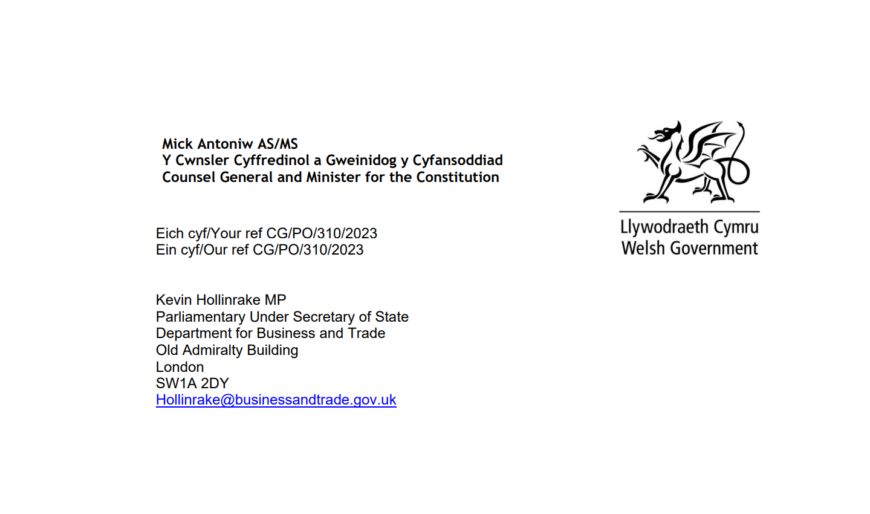Minimum Service Levels: Letter from the Counsel General, Mick Antoniw, to the UK Government.

Kevin Hollinrake MP
Parliamentary Under Secretary of State
Department for Business and Trade
Old Admiralty Building
London
SW1A 2DY
Hollinrake@businessandtrade.gov.uk
19th September 2023
Dear Kevin Hollinrake MP,
I note the UK Government are working to implement the Strikes (Minimum Service Levels) Act, with the development of non-statutory guidance, statutory guidance, and regulations on minimum service levels.
Your Department launched a formal consultation on a ‘Code of Practice on Reasonable Steps’ and is seeking views on guidance on the ‘Issuing of Work Notices’. I also note relevant UK Government Departments will seek to engage us on the development of minimum service levels in respect of various services, including devolved services.
The stance of the Welsh Government has not fundamentally changed now the Bill has become an Act. We continue to have fundamental concerns about the impact of the Act on devolved public services and the very significant potential to destabilise the social partnership relationships at the heart of public service delivery in Wales.
In our view, this Act is unnecessary and probably unworkable. Safeguarding Welsh interests, rather than facilitating the implementation of a counter-productive and damaging Act frames our approach to engaging on its detail.
I have a number of points to make in relation to your consultation on the Code of Practice on Reasonable Steps.
1. Taken as a package of measures, the ‘reasonable steps’ are onerous, excessive and overly prescriptive. The draft Code essentially requires trade unions to act on behalf of employers in requisitioning some workers during periods of strike action. It requires trade unions to act in ways that undermine their own industrial action – action which has a clear and lawful democratic mandate – by publicly and actively encouraging some members to desist from striking while encouraging others to strike. This enforced mixed messaging will cause confusion for workers and for employers and management, who will be expected to navigate such an unnecessarily complex process. It is almost certainly bound to have a more general chilling effect on observance of strike action, whether workers are named in a work notice or not. The draft Code illustrates a complete lack of understanding of how trade unions work and their relationships with their members.
2. It is noticeable the ‘reasonable steps’ place significant additional requirements on trade unions to issue timely communications to their members. According to the draft Code, this is to be achieved issuing a so called ‘compliance notice’ to any members named in a work notice, and a more general ‘information notice’ to members as a whole. Aside from the resource overhead this places upon trade unions, it is noticeable the draft Code recognises the time pressures involved in issuing these communications and suggests electronic methods should be considered. The irony will not be lost that the UK Government recommends trade unions use electronic methods for the purposes set out in the draft Code, but at the same time continues to oppose International Labour Organisation (ILO) and trade union calls for electronic balloting. At best, this approach to electronic methods being appropriate for the ‘reasonable steps’, but inappropriate in statutory ballots is an example of muddled and inconsistent thinking, at worst it is a blatant and egregious example of hypocrisy.
3. The issue of picketing is not mentioned at all in the Strikes (Minimum Service Levels) Act and yet a ‘reasonable step’ within the draft Code of Practice covers picketing. The draft Code contains significant additional and unreasonable expectations of trade unions and picket supervisors in particular. The draft Code places picket supervisors in an invidious position by expecting them to encourage workers named in a work notice to attend work. This section of the Code risks compromising effective and lawful picketing which should have been discussed and scrutinised during the passage of the legislation. It is disingenuous to introduce such a significant requirement in draft statutory guidance, when the issue was barely mentioned prior to the legislation being passed.
Trade Unions and workers face prescriptive statutory guidance in the draft Code and the prospect of significant financial penalties and dismissal for non-compliance. Employers face no such sanctions, and instead have considerable power to requisition workers through a work notice, with relatively loose non-statutory guidance on the approach they should consider. This approach is neither fair nor balanced and will not contribute to a more constructive industrial relations environment.
I have asked my officials to respond to your officials with a number of specific comments on the draft non-statutory guidance on the issuing of work notices.
Finally, I know my Ministerial colleagues and Welsh Government officials are receiving approaches to engage in discussions on setting minimum service levels in passenger rail, fire and rescue, and health services. Our approach to these requests will remain consistent – our aim is to safeguard Welsh interests in these devolved services and to mitigate the many negative impacts of this Act.
In any event, and in contrast to the approach of the UK Government, we will continue to serve the people of Wales by working with devolved public service employers and trade unions to promote a culture of social partners working constructively together.
Yours sincerely,
Mick Antoniw AS/MS
Y Cwnsler Cyffredinol a Gweinidog y Cyfansoddiad
Counsel General and Minister for the Constitution
A pdf version of the letter can be accessed here.







